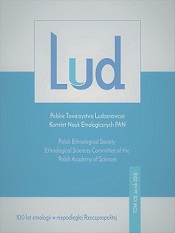KOBIETY I (NIE)OBECNOŚĆ PROBLEMATYKI PŁCI I GENDER W POLSKIM LUDOZNAWSTWIE I ANTROPOLOGII SPOŁECZNO-KULTUROWEJ. SZKIC HISTORYCZNO-AUTOETNOGRAFICZNY
WOMEN AND THE (NON) PRESENCE OF GENDER PROBLEMS IN POLISH VOLKSKUNDE AND SOCIO-CULTURAL ANTHROPOLOGY. A HISTORICAL AND AUTOETHNOGRAPHIC ESSAY
Author(s): Grażyna KubicaSubject(s): Anthropology, Gender Studies, Recent History (1900 till today), Cultural Anthropology / Ethnology, 19th Century
Published by: Polskie Towarzystwo Ludoznawcze
Keywords: anthropology of gender; sex and gender; history of Polish ethnology; women in anthropology; autoethnography;
Summary/Abstract: Themes of gender have been relatively absent in Polish ethnography and ethnology, despite the fact that from the very beginning the discipline enticed many women. Of the first generation of researchers, only Regina Lilientalowa in her studies of Jewish folklore reflected on gender issues. Later it was Maria Czaplicka and Józef Obrębski, who were more concerned with these problems on a theoretical level – both were influenced by the British social anthropology with its sociological bias, while Polish ethnography focused mostly on material culture and folklore, thus gender problems were unimportant. After the Second World War women occupied many important positions in academic ethnography, but this did not mean a more gendered perspective, which can be explained by the theoretical weakness of Polish ethnography at the time and the specificity of Polish emancipation, which was rather practised than reflected upon. It is only recently that young researchers focus on the problems of gender and sexuality, often inventing original ideas and theories. Unfortunately, mainstream Polish ethnology is still to some extent gender blind.
Journal: LUD
- Issue Year: 102/2018
- Issue No: 1
- Page Range: 155-184
- Page Count: 30
- Language: Polish

